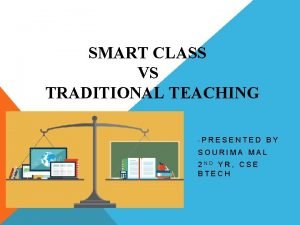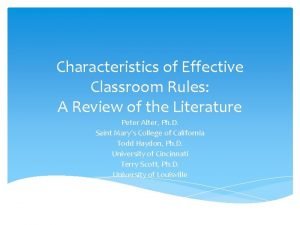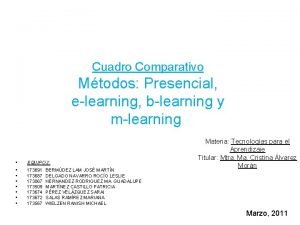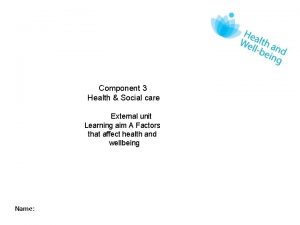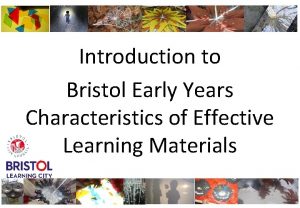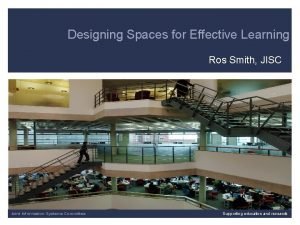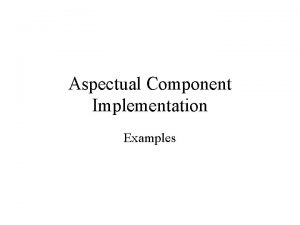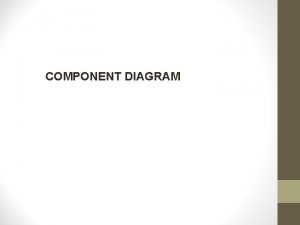EFFECTIVE LEARNING COMPONENT OF CLASSROOM MANAGEMENT Trif Letiia









- Slides: 9

EFFECTIVE LEARNING, COMPONENT OF CLASSROOM MANAGEMENT Trif Letiţia Lector doctor, Universitatea 1 Decembrie 1918, Alba – Iulia, România, e-mail: trifletitia@yahoo. com

1. CONTEMPORANEOUS (PRESENT) EDUCATIONAL PRINCIPLES IN THE PUPILS’ CLASS MANAGEMENT 2. STRATEGIES AND METHODOLOGICAL SUGGESTIONS FOR EFFICIENT LEARNING 3. EFFICIENT LEARNING STRATEGIES

1. CONTEMPORANEOUS (PRESENT) EDUCATIONAL PRINCIPLES IN THE PUPILS’ CLASS MANAGEMENT Classroom management is particularly concerned with various types of learning: -didactic learning itself, acquiring knowledge, forming skills, developing abilities and competences; -socio-relational learning based on a model, forming attitudes towards self, towards others and towards work, developing social behaviour; -normative learning, of moral, school and group rules and regulations.

Correlation of the school success with contemporaneous educational principles School success factors Cognitive and metacognitive factors Principles/norms/ educational rules Principle 1: Learning is an active, volunteer, personal and socially mediated process. Principle 2: Subject involved within learning act is focused on creating the interpretations and coherent configurations in the gained skills’ area, irrespective the quantity and quality of available data. Principle 3: Construction of skills, new cognitive structures is accomplished by integration of previous skills. Principle 4: Learning is significantly facilitated by utilization of strong structured strategies.

Affective-reasoning factors Principle 5: Influence of reasoning on learning. Principle 6: Role of the intrinsic learning reasoning. Principle 7: Main function of reasoning is to support (sustain) the educational effort.

Personality development factors Principle 8: Opportunities and constraints in development Personal and social factors Principle 9: Social and cultural diversity. Principle 10: Social acceptance, self-image and learning. Principle 11: Learning and self-image are reciprocally supported when pupils accept each other as individuals, within the context of some relations based on mutual respect and appreciation. Individual differences Principle 12: Learning is accompanied by some cognitive and social filters. Cognitive and affective structures, attitudes and beliefs existent at a certain moment, become individual references in the construction of reality and interpretation of life experiences.

2. STRATEGIES AND METHODOLOGICAL SUGGESTIONS FOR EFFICIENT LEARNING Factors that influence the reasoning for learning Cultural factors Context factors (related especially to the educational environment) Individual factors

3. Efficient Learning Strategies -creating a stimulating learning environment, together with: a good relationship with students, a pleasant and supportive classroom atmosphere, which are aspects of the relationship which facilitates motivation for learning; -developing a positive attitude towards the subjects, orienting learning towards a set goal, formulating performance expectations in learning, forming realistic beliefs about learning; -maintaining motivation, setting immediate goals, presenting and administering tasks in a motivating way, enhancing the quality of learning experiences, increasing self-confidence, developing a positive image of self, developing autonomy and promoting self-motivation strategies; -completing learning experiences in a positive manner and encouraging positive self-evaluation – providing motivational feedback, improving learning satisfaction, rewards and logical consequences’ management in learning.

Essentially, the efficient learning as a classroom management dimension involves the pupil’s own learning self-adjustment: - motivational aspects (cognitions, feelings and initiation, maintaining direction and learning motivation behaviors and improvement of learning and development opportunities); -strategic aspects.
 Elements of effective classroom management
Elements of effective classroom management Cse smart class
Cse smart class Characteristics of effective classroom rules
Characteristics of effective classroom rules Cuadro comparativo de e-learning
Cuadro comparativo de e-learning Health and social care component 2 learning aim b example
Health and social care component 2 learning aim b example Advantages of learning outside the classroom
Advantages of learning outside the classroom Advantages of learning outside the classroom
Advantages of learning outside the classroom Classroom strategies for interactive learning
Classroom strategies for interactive learning Bristol early years
Bristol early years Ros smith
Ros smith

